
SLAS Technology
Scope & Guideline
Pioneering Solutions in Laboratory Science and Technology
Introduction
Aims and Scopes
- Laboratory Automation and Robotics:
The journal emphasizes the integration of robotics and automation within laboratory settings to improve efficiency and reproducibility in experimental procedures. - Innovative Imaging Techniques:
There is a strong focus on developing and applying advanced imaging technologies for biomedical applications, including optical imaging and MRI, to aid in diagnostics and research. - Machine Learning and Data Analysis:
Machine learning applications are frequently explored, particularly in the context of predictive modeling and data-driven diagnostics, showcasing the journal's commitment to integrating computational techniques in life sciences. - Biotechnology and Bioengineering:
Research related to biotechnological advancements, including bioprinting, synthetic biology, and microfluidics, is a core area, reflecting the journal's commitment to innovative healthcare solutions. - Translational Science and Clinical Applications:
The journal also focuses on translating laboratory research into clinical applications, highlighting studies that bridge the gap between discovery and practical healthcare solutions.
Trending and Emerging
- Artificial Intelligence in Biomedical Applications:
The application of AI and machine learning techniques is rapidly increasing, with a focus on improving diagnostics, drug discovery, and personalized medicine. - Microfluidics and Lab-on-a-Chip Technologies:
There is a growing trend towards microfluidic systems and lab-on-a-chip technologies, which enable high-throughput screening and precise manipulation of biological samples. - Health Informatics and Data Integration:
Research focusing on health informatics, including the integration of big data and machine learning for health monitoring and predictive analytics, is gaining momentum. - Robotics in Healthcare and Laboratory Settings:
The use of robotics for enhancing laboratory automation and patient care, particularly in rehabilitation and surgical settings, is emerging as a significant research area. - 3D Bioprinting and Tissue Engineering:
Innovations in 3D bioprinting and tissue engineering are on the rise, reflecting a shift towards creating complex biological structures for research and therapeutic purposes.
Declining or Waning
- Traditional Laboratory Techniques:
There is a noticeable decline in publications centered around traditional laboratory methods, as the focus shifts toward automated and high-throughput approaches that enhance efficiency. - Basic Research without Automation:
Papers focusing solely on basic research without the integration of automation or technological enhancements are becoming less frequent, indicating a trend toward more applied, technology-driven studies. - Single-Agent Drug Studies:
Research centered on single-agent drug studies is waning, as the emphasis shifts towards combination therapies and personalized medicine approaches that leverage advanced technologies.
Similar Journals
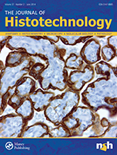
JOURNAL OF HISTOTECHNOLOGY
Pioneering insights in tissue processing and analysis.JOURNAL OF HISTOTECHNOLOGY, published by Taylor & Francis Ltd, is a leading academic journal dedicated to advancing the field of histotechnology, which plays a crucial role in both clinical and research settings. With an established history since 1977, this journal serves as a critical platform for researchers, professionals, and students engaged in the intricate study of tissue processing, staining techniques, and microscopic analysis. It is currently indexed in reputable databases, reflecting its commitment to scientific rigor, with a notable presence in categories such as Anatomy, Histology, and Medical Laboratory Technology. Despite its open access status being limited, the Journal of Histotechnology maintains a respectable impact factor and ranks within the third quartile for Anatomy and Medical Laboratory Technology, and fourth quartile for Histology in 2023, emphasizing its relevance in the scholarly community. As the field continues to evolve, this journal aims to foster innovation and dissemination of knowledge within histotechnology, making it an essential resource for those looking to further their expertise and contribute to the advancements in this vital area of health sciences.
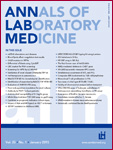
Annals of Laboratory Medicine
Advancing the Frontiers of Laboratory MedicineAnnals of Laboratory Medicine, published by the KOREAN SOC LABORATORY MEDICINE, stands as a pivotal resource for researchers and practitioners in the fields of clinical and medical biochemistry. With a strong Q2 ranking in both Biochemistry (medical) and Clinical Biochemistry, along with a prestigious Q1 status in miscellaneous Medicine categories, this journal emphasizes the significance of laboratory medicine in improving patient outcomes and advancing scientific understanding. Established in 2012, the journal has demonstrated an impressive trajectory of growth and scholarly contribution, making it a reliable source of high-quality research and insightful reviews. The journal utilizes open access, enhancing the reach of its findings across the global scientific community. Operating from South Korea, Annals of Laboratory Medicine aims to foster dialogue and collaboration among professionals, contributing to the continuous advancement of laboratory methodologies and diagnostics.

Revista Romana de Medicina de Laborator
Connecting Researchers to Transform Medical ScienceRevista Romana de Medicina de Laborator is a prominent open-access journal published by SCIENDO, dedicated to the field of medical laboratory technology and biochemistry. Since its inception, this journal has been a vital platform for disseminating research findings and advancements in laboratory medicine. With an ISSN of 1841-6624 and E-ISSN 2284-5623, it has served the academic community since 2008 and has embraced an open-access model since 2013, ensuring that valuable research is accessible to all. While it features niche rankings in Scopus for areas such as Medical Laboratory Technology and Clinical Biochemistry, it consistently strives to engage researchers, professionals, and students. Its rich collection of articles highlights innovative techniques and methodologies, supporting the ongoing development of laboratory practices. Although its coverage in Scopus has been discontinued, the journal continues to publish high-quality studies that contribute significantly to the field, fostering knowledge exchange essential for advancing medical science.
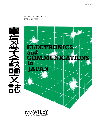
Electronics and Communications in Japan
Empowering innovation in electronics and communication research.Electronics and Communications in Japan, published by WILEY, serves as a vital platform for researchers and practitioners in the fields of applied mathematics, electrical and electronic engineering, and computer networks and communications. With a focus on advancing the understanding and development of communication technologies, this journal has been disseminating valuable research since its inception in 1975, including significant contributions from 2008 to 2024. While it currently holds a Q4 ranking in several categories including Physics and Astronomy, Applied Mathematics, and Signal Processing, it offers an essential outlet for emerging ideas and practices in these disciplines. As an open-access journal, it ensures that cutting-edge research is accessible to a global audience, supporting collaboration and innovation within the academic community. With an ISSN of 1942-9533 and an E-ISSN of 1942-9541, Electronics and Communications in Japan not only contributes to the scholarly discourse but also plays a critical role in shaping the future of technology and communication.
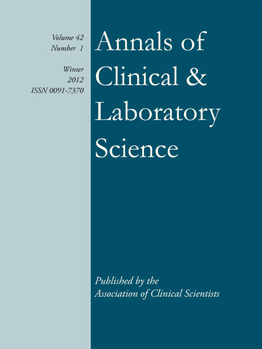
ANNALS OF CLINICAL AND LABORATORY SCIENCE
Transforming Healthcare Through Scientific DiscourseANNALS OF CLINICAL AND LABORATORY SCIENCE, published by the Association of Clinical Scientists, is a pivotal journal in the fields of clinical biochemistry, hematology, immunology, and medical laboratory technology. Since its inception in 1971, this journal has become a vital resource for researchers and practitioners aiming to advance their knowledge and skills in laboratory sciences. Although currently not an open access journal, its rich repository of peer-reviewed articles and studies contributes significantly to the academic discourse in diagnostic and therapeutic practices. The journal is categorized in various quartiles, reflecting its impact and contributions to multiple scientific domains, such as Q4 in Clinical Biochemistry and Q3 in Pathology and Forensic Medicine as of 2023. With an extensive convergence of years up to 2024, it proves to be a timeless source for emerging trends and research innovations. The ANNALS OF CLINICAL AND LABORATORY SCIENCE not only supports the professional development of its readers but also encourages interdisciplinary collaboration, making it an essential tool for professionals, students, and researchers dedicated to improving health outcomes through advanced laboratory sciences.

TEHNICKI GLASNIK-TECHNICAL JOURNAL
Advancing Innovation in Engineering and TechnologyTEHNICKI GLASNIK-TECHNICAL JOURNAL is a peer-reviewed, open-access journal published by UNIV NORTH in Croatia, dedicated to fostering knowledge and innovation in the fields of engineering, computer science applications, and information systems. With an ISSN of 1846-6168 and an E-ISSN of 1848-5588, this journal has been a vital resource for researchers since its transition to open access in 2009, ensuring that valuable insights are freely available to the global academic community. Notably, it has achieved a commendable presence in various Scopus categories, including ranking in the 34th percentile for general engineering and engaging with emerging trends in areas like computer graphics and management information systems. As of 2023, it holds quartile rankings ranging from Q3 in engineering to Q4 in several computer science categories, underlining its diverse scope and relevance. The journal aims to provide a platform for rigorous research, innovative methodologies, and practical applications, making it essential reading for academics, practitioners, and students interested in advancing their understanding and practice in technical disciplines.

Advances in Laboratory Medicine-Avances en Medicina de Laboratorio
Exploring New Frontiers in Laboratory Science.Advances in Laboratory Medicine - Avances en Medicina de Laboratorio is a distinguished open-access journal published by Walter de Gruyter GmbH, dedicated to the field of medical laboratory technology and the broader aspects of laboratory medicine. Launched in 2020, this journal aims to disseminate high-quality research, innovative methodologies, and critical reviews that foster advancements in laboratory practices. With significant rankings, including Q3 in Medical Laboratory Technology and Q4 in Education and Medicine (miscellaneous) as of 2023, it serves as a vital resource for researchers, professionals, and students interested in enhancing their understanding and implementation of laboratory protocols. Based in Germany, the journal not only emphasizes accessibility through its open-access model but also contributes significantly to the evolving landscape of medical laboratory science. Join a community of scholars striving to improve patient outcomes and elevate standards within the laboratory domain.
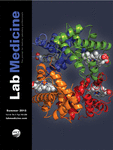
LABORATORY MEDICINE
Connecting researchers to the pulse of laboratory innovation.LABORATORY MEDICINE, published by Oxford University Press, is a pivotal journal in the fields of biochemistry and clinical biochemistry, officially indexed under ISSN 0007-5027 and E-ISSN 1943-7730. Since its inception in 1973, it has provided a vital platform for the dissemination of high-quality research, facilitating scholarly communication and innovation in laboratory diagnostics and biochemistry practices. The journal is classified in the Q3 quartile for medical biochemistry and Q4 for clinical biochemistry, reflecting its commitment to enhancing the scientific community's understanding of laboratory science. With its quarterly publications and rigorous peer-review process, LABORATORY MEDICINE serves as an essential resource for researchers, professionals, and students alike, offering insights into the latest developments and methodologies in the field. As a part of a rapidly evolving discipline, the journal is not only dedicated to publishing original research but also aims to present reviews, case studies, and expert opinions that contribute to the advancement of laboratory medicine. In a global context, it emerges as a significant player, prioritizing accessibility, though currently maintaining a subscription-based model, facilitating informed research and clinical application.

Pertanika Journal of Science and Technology
Fostering innovation across diverse scientific fields.Pertanika Journal of Science and Technology, published by UNIV PUTRA MALAYSIA PRESS, stands as a significant platform in the fields of Agricultural and Biological Sciences, Chemical Engineering, Computer Science, and Environmental Science. With an ISSN of 0128-7680, this esteemed journal aims to foster high-quality research and knowledge sharing by presenting novel studies and advancements from 2010 onwards, with expectations of convergence until 2024. Recognized as a Q3 journal in multiple categories, including miscellaneous fields of the aforementioned domains, it offers a valuable resource for researchers, students, and industry professionals seeking to push the boundaries of science and technology. Though access options are currently limited, the journal's commitment to disseminating essential findings contributes to its credibility and relevance in the academic community, making it an essential read for those invested in cutting-edge scientific research and development. Based in Serdang, Selangor, Malaysia, the journal not only caters to a global audience but also emphasizes the significance of local research advancements in a broader context.
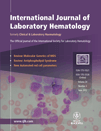
International Journal of Laboratory Hematology
Connecting research and practice for the future of laboratory hematology.The International Journal of Laboratory Hematology, published by WILEY, serves as a vital resource in the field of hematology, delivering high-quality research findings and innovations within laboratory practices since its inception in 2007. This journal, accessible under Open Access options, showcases cutting-edge studies that span critical aspects of biochemistry and clinical laboratory methodologies. With a notable impact factor reflected in its Q2 and Q3 rankings across various categories—such as Biochemistry (medical) and Hematology—this journal stands out within the Scopus rankings, positioning itself within the 60th and 59th percentiles of its respective fields. Situated in the United Kingdom, the journal's objectives lie in disseminating pivotal research that enhances our understanding of hematological disorders and laboratory techniques, making it an essential tool for researchers, professionals, and students alike who are committed to advancing the science of laboratory hematology and its applications.